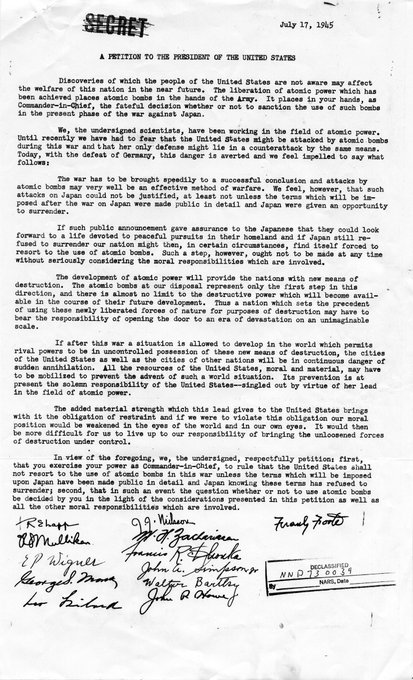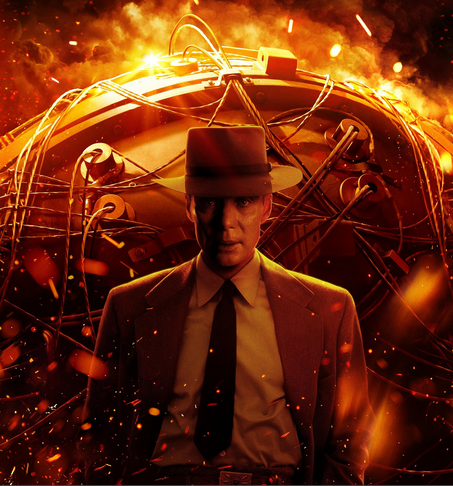More often than not, evil is not one great shocking act. Mundane evil is the most prevalent form.. and what we come to see as great evil sometimes [usually in retrospect], starts with small tasks, and accumulates simple additions as it goes.
Ironically, I think this summarizes “Oppenheimer” – the events, and the 2023 film.

“The greatest evils in the world will not be carried out by men with guns, but by men in suits sitting behind desks.”
C.S. Lewis
The unseen also tells a story
Being a work of art, not a documentary, it might not be fair to impose our expectations on Christopher Nolan. It was a great film, visually.. but… “#Oppenheimer” downplayed two important – and very relevant – bits : (1) What the bomb did, and (2) How relevant was deploying the bomb to the war effort?
I think these two questions are important to the theme of ‘mundane evil’. I’m sure many don’t want to read this, because ‘evil’ is usually the ‘other guys’ (i.e. The Nazis , The Japanese, etc..). These questions, however, are instrumental to the ‘guilt’ and the ‘reward’ that plagued ‘Oppie’ at the end, and to questioning some artistic choices of the film itself.
We love the bomb, but do we really need it ?
On question (2), which is a huge debate, there seems to be a lot of evidence that the war was almost over before dropping the bomb. Russia was also about to join the effort (against Japan, which realistically had no hope, and seems that its generals were just negotiating the future of the emperor) on that front. Here are some samples:
– Eisenhower in his memoirs : “voiced to him my grave misgivings, first on the basis of my belief that Japan was already defeated and that dropping the bomb was completely unnecessary, and secondly because I thought that our country should avoid shocking world opinion by the use of a weapon whose employment was, I thought, no longer mandatory as a measure to save American lives.”
– Truman in his memoirs : “Stalin told Churchill of a telegram from Japanese emperor asking for peace.. believe the Japanese will fold before Russia comes in. I am sure they will when Manhattan appears on their homeland.” [there is another entry where he says that he instructed the military to only use the bomb against military bases]
– Adm. William Leahy, Truman’s Chief of Staff : “The use of this barbarous weapon…was of no material assistance in our war against Japan.”
– Adm. William “Bull” Halsey Jr., the commander of the US Third Fleet, stated publicly in 1946 that “the first atomic bomb was an unnecessary experiment…. It was a mistake to ever drop it…. [The scientists] had this toy, and they wanted to try it out, so they dropped it…”
So was ‘Oppenheimer’ a stoic – someone ‘doing their job’, more interested in the science than the actual/real outcomes? Why didn’t he even consider the petition that Szilard and other colleagues were signing (threaten Japan… but give peace a chance before dropping the bomb)?? That would have enriched the film and showed the character on a deeper level.
The bomb did not win the war.
The Scientist’s Job : Mundane Job .. Mundane Evil
Some scenes in the film are visually amazing, but the most beautiful contrast of the story was what Hannah Arendt would refer to as : the banality of evil.
The bomb – in reality – was created, and around 0.2M people killed in seconds (+ others over longer periods, including mutilations and birth defects) because it was ‘someone’s Job’… Oppenheimer and others were doing their job! A job where simple professional aspirations apply, and petty competition for position or rank is quite clear.
There really wasn’t a moral race [Nazi Germany was defeated in May 1943 –> The bomb was dropped in August 1945 ; Japan was most likely in the process of surrendering – the discussion was probably about what role the emperor would have after the war]. These scientists were simply ‘working’ and minding their careers.
The ‘killing’ is somebody else’s responsibility (actually responsibility eventually gets lost in common/collective decision-making).
Who is most guilty : the president who gives the order, the general who recommends the action, the politician who supports it, the scientist who develops the bomb, or the soldier who throws it…? Seems quite hard to make a decision when it is stated like that.
But picture this :
- It is reported that Oppenheimer (Oppie, because we’re all friends here) made sure the soldiers received specific instructions on how/where the bomb needs to be dropped to maximize damage. Does this fact somehow change any of your perceptions?
The Director’s Job : It wasn’t me
In a (narrow) sense, Nolan – not unlike Oppenheimer – was ‘doing his job’. He was creating a beautifully directed, and widely accepted film, with minimal controversy, regardless of certain moral or ethical considerations related to the truth or the victims of the ‘cool’ Manhattan project. In fact, the focus on Oppenheimer’s plight towards the end and his disappointment with congress was somehow problematic (emphasis-wise)..
In the presence of all these innocent victims, how can revoking someone’s security clearance be given all this breadth? (If it were part of building the case for dissecting a psychopath personality, it would have been fine, but it wasn’t.. it was about a bunch of relationships).
This takes me to my initial point, on the artist’s freedom… which is a requirement for creativity… but in this case, and in a few others, it is not completely unrelated to mundane evil.
Closing Words : On Responsibility
Both, Oppenheimer and Nolan, work in the creative industries.
Both – supposedly – receive a bigger freedom in their professional roles as they interact with creativity and knowledge.
Still, somewhere, the technical essence of the job seems to dominate its other/deeper moral and ethical dimensions. The sense of responsibility gives way to something else.
Is it good enough to be loyal to the art / science, without regard to the implications, which are ‘somebody else’s job’ (a position that is somehow reasonable: “I do the art/science, you manage the politics”)?
Truman is reported to having said after the meeting with Oppenheimer : (there’s) “no time for pretentious melodramatic Indian mysticism.” “Never bring that #@!$!#@ cretin in here again. He didn’t drop the bomb. I did. That kind of weepiness makes me sick.”
This takes me back to the question on responsibility… Who dropped that bomb?..
Also, was Truman on to something when he called Oppenheimer’s attitude ‘pretentious’ and ‘melodramatic’? Is his mystic utterance (Now I am become death…) a symptom of remorse, or a self-aggrandizing reflection intended to signal something that wasn’t genuinely there??
Notes:
This post originally started as a Twitter post that grew progressively (Link).
In ‘Fuzzy on the Dark Side‘, I discuss in detail some of the ‘mundane’ (not necessarily evil) aspects of science, and how scientific progress itself can be plagued by personal ambitions, job security, misunderstandings, and conflation. Oppenheimer seems to have been an opponent of the H-bomb project, because he wanted more focus to be dedicated to his own A-bomb project… a simple camp-loyalty could have been the reason behind a position which seems much more exalted than it really is.


